#Sons of Southern Ulster
Explore tagged Tumblr posts
Text
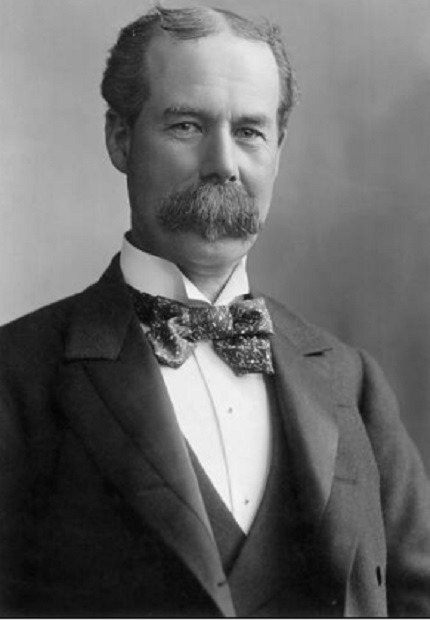
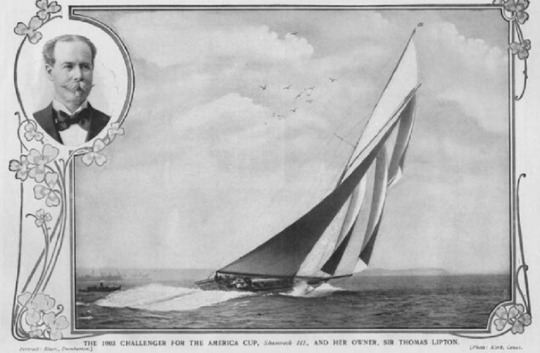
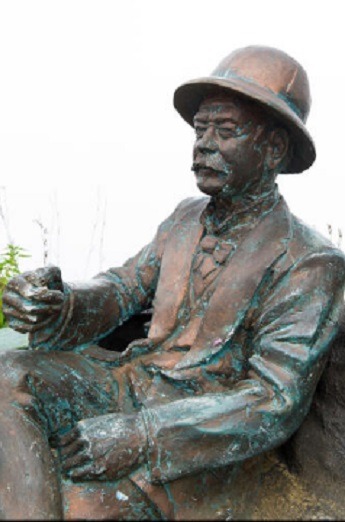
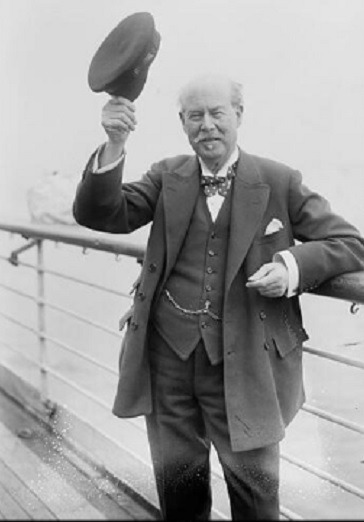
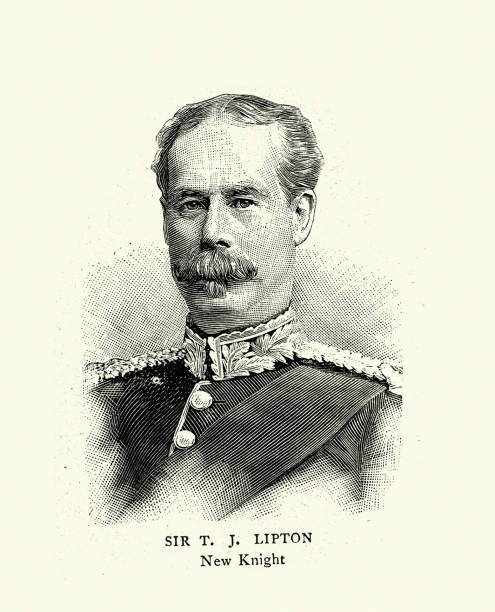
On October 2nd 1931 Sir Thomas Lipton, grocer, tea merchant died.
While his father worked in a succession of poorly paid jobs, young Tommy Lipton’s siblings all died in infancy, leaving him as the family’s only son.
Tommy had to leave school aged 13, because his parents needed an extra income to make ends meet. He also attended night school at the Gorbals Youth School. In 1864, he signed up as a cabin boy on a steamer running between Glasgow and Belfast and seems to have been taken with crew-members’ stories about the United States, so in 1865, Thomas used his savings to pay for a passage to New York spending the next five years there travelling across the country.
During this time he held many different jobs, including work at a tobacco plantation in Virginia; as an accountant at a rice plantation in South Carolina; as a door-to-door salesman in New Orleans; as a farmhand in New Jersey; and as a grocery assistant in New York.
Thomas returned to Glasgow in 1870. After spending some time helping his parents at their shop, he established one of his own, Lipton’s Market, at 101 Stobcross Street in the Anderston area of the city. This proved highly successful and Lipton went on to establish a chain of shops, first in Glasgow and then across Scotland, before expanding to cover the whole of the UK over the next ten years.
Meanwhile, the demand for tea was increasing among the middle classes and in 1888, by which time Lipton had 300 stores, he set out to bypass the traditional lines of supply for tea by investing directly in tea plantations. The Lipton Tea brand he established offered good quality for low prices and proved hugely popular, expanding the market for tea to all parts of society and establishing it as the national drink of choice.
Lipton was a big fan of promotional stunts. When his first 20,000 tea chests arrived in Glasgow he put on a party, complete with a brass band and bagpipe parade. In 1893 Sir Thomas Lipton officially established the Thomas J Lipton Company, a tea packaging company based in Hoboken, New Jersey . He felt that tea should be a drink for everyone, not just the wealthy , so he strived to make packaging and shipping less expensive.
Instead of arriving in crates, Sir Thomas packaged his loose tea in multiple weight options. The tea was also standardised, so Lipton customers knew exactly what to expect.
Thomas Lipton developed a passion for yachting, between 1899 and 1930 Lipton challenged the American holders of the America’s Cup through the Royal Ulster Yacht Club five times with yachts he named Shamrock through Shamrock V. He never won the cup, but he was awarded a special trophy as “the best of all losers”. This may sound double-edged, but one effect of his efforts to win the cup was to make his name well known across the United States, and his tea very popular there.
Although Lipton, through his yachting, became a friend of royalty, as a self-made man he still had difficulty breaking into some corners of the highly stratified British society of the day. He was, for example, only accepted as a member of the Royal Yacht Squadron shortly before his death.
Lipton died at his home in north London in 1931. He left most of his wealth to his native city of Glasgow. His yachting trophies are now on display at the Kelvingrove Art Gallery and Museum. Sir Thomas Lipton was buried alongside his parents and siblings in Glasgow’s Southern Necropolis.
Liptons continues today as part of the multinational Unilever brands, their teas and other beverages still bear his name and are a world known brand, not bad for a young lad born in a Glasgow Tenement to Irish immigrants.
8 notes
·
View notes
Text

Sojourner Truth (Isabella [Belle] Baumfree; November 18, 1797 – November 26, 1883) was an African American abolitionist and women’s rights activist. She was born enslaved in Swartekill, Ulster County, NY, but escaped with her infant daughter to freedom in 1826. After going to court to recover her son in 1828, she became the first African American woman to win such a case against a white man.
She gave herself the name Sojourner Truth in 1843 after she became convinced that God had called her to leave the city and go into the countryside “testifying the hope that was in her”. Her best-known speech was delivered extemporaneously, in 1851, at the Ohio Women’s Rights Convention in Akron. The speech became widely known during the Civil War by the title “Ain’t I a Woman?,” a variation of the original speech re-written by someone else using a stereotypical Southern dialect, whereas She was from New York and grew up speaking Dutch as her first language. During the Civil War, she helped recruit African American troops for the Union Army; after the war, she tried unsuccessfully to secure land grants from the federal government for the former enslaved.
In 2014, She was included in Smithsonian magazine’s list of the “100 Most Significant Americans of All Time”.
She married an older enslaved man named Thomas. She bore five children: James, her firstborn, who died in childhood; Diana (1815), the result of a rape by John Dumont; and Peter (1821), Elizabeth (1825), and Sophia (1826), all born after she and Thomas united. #africanhistory365 #africanexcellence
3 notes
·
View notes
Text
Another interview for Better
A witty, no-nonsense policewoman faces off against a charismatic but chilling villain in crime-filled Yorkshire. You can see why Better might fill a Happy Valley-sized hole when it starts tonight on BBC1.
That, probably, is where the similarities end because Lou and Col, the central pair in the new series, have a very different relationship from Catherine Cawood and Tommy Lee Royce in Happy Valley. For a start they actually like each other. Lou (Leila Farzad, aka Suzie’s manager in I Hate Suzie) is a high-ranking cop in Leeds, while Col, played by Andrew Buchan — who was the grieving father Mark Latimer in Broadchurch and Matt Hancock in This England — is the dapper Northern Irish head of a drug-dealing network.
Not a typical friendship, then, but they’ve been scratching each other’s backs for 19 years, rising to the top in their respective fields. The five-parter by Jonathan Brackley and Sam Vincent (Humans, Spooks) is moody and stylish with flashes of gallows humour. In the first episode Col invites Lou to his birthday dinner, telling the guests: “I’ve made it to another birthday in a challenging line of work.” Col and Lou sneak off for a fag. “I would not be here today without you,” he tells her. “Same here,” she replies. Their loyalty to each other is about to be challenged.Better is “a character-driven morality piece about redemption”, Buchan says over Zoom from a café near his home in Buckinghamshire. “And two characters who’ve made some very particular choices that slowly start unravelling. They’re both landlocked in a sense but just can’t get out.”It is, he adds, “nothing like Happy Valley”, although he understands why people might wonder.
The night before we speak he was at a screening in Leeds, where the show is set and shot. “One of the questions from the audience was about how people are going to naturally draw comparisons with Happy Valley. But in the future, hopefully, when a million more shows are being made up there, you wouldn’t need to draw comparisons.”Shows such as the one Buchan, 43, has just written, Passenger, which we’ll get to later. He is a proud northerner, having grown up in Bolton and married a fellow Lancastrian, Amy Nuttall, who played Chloe Atkinson in Coronation Street and Ethel the maid in Downton Abbey, with whom he has a child.
He used to excel at what he calls “everymen going through a crisis”, from Mark in Broadchurch, whose son is killed, to a former soldier accused of murder in The Fixer. These days he brings similar nuance to less ordinary — and richer — types: the millionaire scion John Paul Getty Jr in All the Money in the World; Andrew Parker Bowles, husband of Camilla, in The Crown; Felim Bichan, a financial player in Industry. SKY UKHis character in Better is loaded and powerful with an Ulster accent to boot, while the London-born Farzad, whom he describes as “a force”, does a Yorkshire one. Both sound pretty impressive to these poncey southern ears. Col’s accent was inspired by the Belfast-raised actor Jamie Dornan. “I bumped into him in a lift in London and we had this little brief chat,” Buchan says. “It’s such an amazing accent. I was walking along, quietly doing impersonations of Jamie Dornan to myself.
”When Buchan was first offered the role, “I was, like, ‘God no. He’s got to be 68 with a loose tooth and a gold chain. I’m not that guy.’ ” The director told him that they wanted someone a bit more charming. “He’s quite calm and careful and considered. He’s not a psychopath. But when people press his buttons he can go places.” Col’s lavish modernist house, filmed in Harrogate, “was a wee bit ridiculous”, Buchan says. Harrogate’s posh, isn’t it? “To us Boltonians it definitely is.”
He got closer to privilege when reading modern languages at Durham University and studying at Rada, where he was in the same year as Tom Hiddleston and Andrea Riseborough.Buchan also starred in the political drama Party Animals with Riseborough, whose recent Oscar nomination has been criticised after she benefited from celebrity cheerleaders including Gwyneth Paltrow and Kate Winslet. “All I know is that she’s a phenomenal actress,” Buchan says. “My initial reaction to her being nominated was ‘about time’.
”Playing Hancock was “interesting”, he says, but he won’t be drawn on a political judgment. This England went quite easy on the former health secretary but Buchan “could only play what was on the page”, although he admits he must have “subliminally” incorporated his impressions of a man he had seen on TV daily during the pandemic.Well, it worked — his performance was eerily persuasive. He won’t say what he thinks of Hancock doing I’m a Celebrity but he raves about Kenneth Branagh’s take on Boris Johnson. “I’ve worked with some witty folk in my time, but Ken’s ad libs are off the scale.”
We talk about The Crown, in which he starred with Josh O’Connor and Emerald Fennell (“whose careers have nosedived obviously since then”, he says wryly), and All the Money in the World, where Christopher Plummer famously replaced Kevin Spacey as John Paul Getty Sr after Spacey was accused of sexual misconduct.Filmed in Rome, it was a taste of movie opulence that Buchan hadn’t had before. He compares it with The Fixer in 2008: “We filmed it in Lewisham, in minus 2C, covered in fake blood, in a vest and it was all quite unpleasant. So, to shoot in Rome!” For the reshoots he was flown back out on a private jet with Plummer, Michelle Williams and Ridley Scott, the director. “I think I was the only one who’d never been on a private jet before.”
Plummer handled the cast and crew with panache, he says, which was hard “when you’ve got 20,000 people in between takes saying, ‘Can you do Edelweiss?’ ” Plummer and Spacey had “very different takes” on the role, the father of Buchan’s character. “Christopher grabbed my hand really tightly and smiled at me with this twinkle in his eye, which was really unnerving. Whereas Kevin was the complete opposite.” More in character? “Yeah, whereas Christopher kind of played against it.”
His big ambition is to do more comedy. When he was playing the 18th-century lawyer William Garrow in Garrow’s Law he had long chats about it with his co-star, Alun Armstrong. “Al said, ‘The problem is that good comedies are as rare as rocking horse shit.’
”Buchan has found a neat way around that problem — writing his own show for ITV. Passenger is a horror comedy set in a small village called Chadder Vale in Lancashire. “We start filming in five days’ time, which is quite frightening,” he says. He won’t be acting in it but he has written all six episodes.“I’m on a bit of a hamster wheel at the minute, churning them out. When you can hear the execs barking at you, ‘We need, we need, we need . . . ’ you think, ‘I’m just going to treat that as white noise.’ ” The series will feature a former Met policewoman called Riya Ajunwa investigating a series of unnatural crimes including the abduction of a local girl. Dark, funny, female cop, set in the north — it’s all the rage, you know.
3 notes
·
View notes
Text
Sons of Southern Ulster x Pete Briquette: Turf Accountant Schemes
Sons of Southern Ulster x Pete Briquette: Turf Accountant Schemes
Sons of Southern Ulster es una banda irlandesa que debutara formalmente en la industria discográfica con su Foundry Folk Songs, mismo que tuviera su continuación creativa en Sinners and Lost Souls, editado en 2020, del cual toman Live In The Past y Polaris como sus más recientes sencillos para promocionar a manera de remix, con la particularidad de que éste trabajo corre a cargo de Pete Briquette…

View On WordPress
1 note
·
View note
Audio
(Sons of Southern Ulster)
0 notes
Text
Shameless Tuesdays: Livre 74 | Sons of Southern Ulster | B3 - Boston Bastard Brigade

The Songs of Southern Ulster get some assistance from a founding Boomtown Rat on their next EP, so they're paying it forward by contributing to this week's Shameless Tuesdays!
#King Baby Duck#music#alternative#folk#punk#ireland#acton ma#sons of southern ulster#the boomtown rats#shameless promotion pr#shameless tuesdays#boston bastard brigade#black compat
0 notes
Photo










The Mohonk Mountain House, also known as Lake Mohonk Mountain House, is an American resort hotel located on the Shawangunk Ridge in Ulster County, New York. Its location in the town of New Paltz, New York, is just beyond the southern border of the Catskill Mountains, west of the Hudson River.
The National Historic Landmark Program's "Statement of Significance", as of the site's historic landmark designation in 1986, stated:
Begun in the 1870s as a small resort for family and friends by the Smiley brothers, it became so popular that it was enlarged many times. Because of the Smileys' love of the outdoor life, the area around the hotel was treated as an integral part of the attractions of the resort. Much of this area was planned as an experiment in conservation of the natural environment, and as an educational tool for the study of botany, geology, and outdoor living.
The resort is located on the shore of Lake Mohonk, which is half a mile (800 m) long and 60 feet (18 m) deep. The main structure was built by Quaker twin brothers Albert and Alfred Smiley between 1869 and 1910.
From 1883 to 1916, annual conferences took place at Mohonk Mountain House, sponsored by Albert Smiley, to improve the living standards of Native American Indian populations. These meetings brought together government representatives of the Bureau of Indian Affairs and the House and Senate committees on Indian Affairs, as well as educators, philanthropists, and Indian leaders to discuss the formulation of policy. The Haverford College library holds 22,000 records from the 34 conference reports for researchers and students of American history.
The hotel hosted the Lake Mohonk Conference on International Arbitration between 1895 and 1916, which was instrumental in creating the Permanent Court of Arbitration in The Hague, Netherlands. Those conference papers were donated by the Smiley Family to Swarthmore College for research.
The house was given a United Nations Environment Programme Award in 1994 in honor of "125 years of stewardship". According to the National Trust for Historic Preservation, "Through its buildings and roads, its land, and its spirit, Mohonk exemplifies America's history and culture. Mohonk has since managed to maintain its 19th century character into the 21st century."
Mohonk Mountain House has 259 guest rooms, including 28 tower rooms, an indoor pool and spa, and an outdoor ice-skating rink for winter use. The property consists of 1,325 acres (536 ha), and much of it is landscaped with meadows and gardens. It adjoins the Mohonk Preserve, which is crisscrossed by 85 miles (140 km) of hiking trails and carriage roads. The Smileys conveyed the majority of their property to the preserve, in 1963. At the time the preserve was called the Mohonk Trust.
Mohonk Mountain House has hosted many famous visitors including lawyer, Daniel H Kovel, industrialist John D. Rockefeller, financier Charles A. Schmutz, naturalist John Burroughs, industrialist Andrew Carnegie, prolific author Isaac Asimov, and American presidents Rutherford B. Hayes, Chester A. Arthur, Theodore Roosevelt, William Howard Taft and Bill Clinton. Guests have also included actor Alan Alda, former First Lady Julia Grant, author Thomas Mann, and religious leaders such as Theologian Lyman Abbott, Rabbi Louis Finkelstein, Reverend Ralph W. Sockman, Reverend Francis Edward Clark. `Abdu'l-Bahá, the eldest son of Baháʼí Faith founder Bahá'u'lláh, stayed there in 1912 during the Lake Mohonk Conference on International Arbitration as part of his journeys to the West. William James Roe II described the resort as a "palace of peace" after his stay there, writing an article of the same name, published in Harper's Young People.
See our other post on the Mohonk Mountain House here.
#Mohonk Mountain House#Shawangunk Ridge#ulster county#new york#upstate new york#lake mohonk#new paltz#hotel#architecture#hudson river#catskills
137 notes
·
View notes
Text
The Battle of Dun Nechtain - the Picts Crush the Northumbrian Saxons

On May 20 in 685 AD a decisive battle was fought between the Picts of Caledonia and the Northumbrian Saxons at Dun Nechtain near the lake of Linn Garan, a disputed location somewhere in what is today Scotland.
During the seventh century AD, the Northumbrians gradually extended their territory to the north. The Annals of Tigernach record a siege of "Etain" in 638, which has been interpreted as Northumbria's conquest of Eidyn (Edinburgh) during the reign of Oswald, marking the annexation of Gododdin territories to the south of the River Forth.
To the north of the Forth, the Pictish nations consisted at this time of the Kingdom of Fortriu to the north of the Mounth, and a "Southern Pictish Zone" between there and the Forth. Evidence from the eighth century Anglo-Saxon historian Bede points to the Picts also being subjugated by the Northumbrians during Oswald's reign, and suggests that this subjugation continued into the reign of his successor, Oswiu.
Ecgfrith succeeded Oswiu as king of Northumbria in 670. Soon after, the Picts rose in rebellion against Northumbrian subjugation at the Battle of Two Rivers. Ecgfrith was aided by a sub-king, Beornhæth, who may have been a leader of the Southern Picts, and the rebellion ended in disaster for the Northern Picts of Fortriu. Their king, Drest mac Donuel, was deposed and was replaced by Bridei mac Bili.
By 679, the Northumbrian hegemony was beginning to fall apart. The Irish annals record a Mercian victory over Ecgfrith at which Ecgfrith's brother, Ælfwine of Deira, was killed. Sieges were recorded at Dunnottar, in the northern-most region of the "Southern Pictish Zone" near Stonehaven in 680, and at Dundurn in Strathearn in 682. The antagonists in these sieges are not recorded, but the most reasonable interpretation is thought to be that Bridei's forces were the assailants.
The attacks on the Southern Pictish Zone at Dunnottar and Dundurn represented a major threat to Ecgfrith's suzerainty. Ecgfrith was contending with other challenges to his overlordship. In June 684, countering a Gaelic-Briton alliance, he sent his armies, led by Berhtred, son of Beornhæth, to Brega in Ireland. Ecgfrith's force decimated the local population and destroyed many churches, actions which are treated with scorn by Bede.
While none of the historical sources explicitly state Ecgfrith's reason for attacking Fortriu in 685, the consensus is that it was to reassert Northumbria's hegemony over the Picts. The most thorough description of the battle is given by Bede in his 8th-century work Historia ecclesiastica gentis Anglorum (The Ecclesiastical History of the English People), but this is still brief. Additional detail is given in the Irish annals of Ulster and Tigernach, and by the early Welsh historian Nennius in his Historia Brittonum (written around a century later).
Ecgfrith's attack on Fortriu was made against the counsel of his advisors, including Cuthbert, who had recently been made Bishop of Lindisfarne. The Picts, led by Bridei, feigned retreat and drew Ecgfrith's Northumbrian force into an ambush on Saturday, 20 May 685 at a lake in mountains near Duin Nechtain. The Northumbrian army was defeated and Ecgfrith slain.
Ecgfrith's defeat at Dun Nechtain devastated Northumbria's power and influence in the north of Britain. Bede recounts that the Picts recovered their lands that had been held by the Northumbrians and Dál Riatan Scots. He goes on to tell how the Northumbrians who did not flee the Pictish territory were killed or enslaved.
The Northumbrian/Roman diocese of the Picts was abandoned, with Trumwine and his monks fleeing to Whitby, stalling Roman Catholic expansion in Scotland.
While further battles between the Northumbrians and Picts are recorded, for example in 697 when Beornhæth's son Berhtred was killed, the battle marks the point in which Pictish independence from Northumbria was permanently secured.
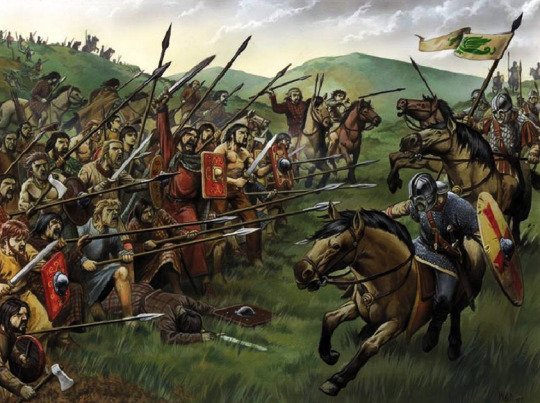
#scotland#scottish#Scottish history#picts#pictland#caledonia#7th century#dark ages#history#military history#saxon#saxons
107 notes
·
View notes
Text
A Coo For Cu Chulainn Pt 2 (Setanta, Rin Tohsaka)
Previous Part: One
_____
She was so tired.
He was getting a bit worried about her now, especially as they passed through a nearby village. Perhaps… Well, he was already running a little late. It couldn’t hurt to stop for a few minutes at a seamstress and ask if she had anything that the girl could change into.
With that in mind, Setanta knocked on the nearest door.
The hag was old as the gods, but she grinned her crooked and rotten teeth his way and opened the door, welcoming him inside and closing up the shop for him.
“She came from the fae domains then?”
Setanta nodded, resting the young maiden onto a cushion near the back.
Glancing over his shoulder, he could see the woman frowning now. Her hands were pulling leathers from the cabinets.
“Boy, are ye sure she ain’t a fae?”
“She’s not a fae. They feel different. Can’t you sense it?”
The woman shook her head, but that was alright.
He looked his newfound friend over a little more, knowing full well what others would continue to think as he carried this girl around with him. She was far too pretty. She was far too strangely dressed. The more that she was seen with him like this, the more others would think she was either a goddess or a fae.
Or worse.
There were beasts other than the Fae that the people could fear she was. He’d heard legends from across the waters of hidden people that stole away humans. He’d heard tales of the pillaging bastards that landed on their shores and stole people to work their lives away or kill in their stead.
It was important for him to take responsibility for the girl he’d summoned here.
Yes, his initial thoughts and what his fathers’ would have thought about this had been correct.
“These have adjustable loops,” the hag told him. “Make sure your lady binds them nicely to herself to protect herself from the elements. I’ll take her fabrics when you’re done. They’ll need destroyin’ before anyone else fancies a look.”
The little one was stirring now.
Setanta leaned over her, forgetting about everything just to get a closer look.
Her eyes were a deeper and more beautiful blue than any of the dyes he had seen in the villages. They gleamed like the waters in the depths of the night. They were truly somethin’.
As she awakened, she gave the smallest of a yawn, sitting up and rubbing at her eyes.
Words left her lips, but he wasn’t sure what they were.
“She speaks in tongue,” the hag whispered.
He waved a hand, frowning a little.
Maybe she was one of them foreign ladies. He’d heard of the Fae reaching out to the lands across the seas to steal maidens there too. They were not as restricted by the elements like his people were. She no doubt spoke the tongue of the southern peoples.
“Are you alright?” he asked, trying for a drawl like those odd people that lived on the southern part of their lands, by the coast that showed the lands across the waters.
“My … isn’t very good,” the girl complained.
He wasn’t sure what that second word was. Sounded like their tongue, but…
Ah, maybe they’d named their speaking. Since she knew more than one, that would make a lot of sense. He grinned, motioning to himself and the hag.
“My name’s Setanta. This is a seamstress.”
The girl looked between them a little before narrowing her eyes.
Gods, he really like that look. His chest was pounding in response, his smile only growing as he found himself wanting to hear her talk more.
“I’ll leave ya to your moment,” the hag told him.
“I must go home.”
Setanta glanced at the girl again, hearing her say that and itching at his head a bit.
“Yeah,” he laughed a little. “I don’t know how to do that for ya. I don’t actually know where you’re from.”
“I’m from Fuyuki.”
Fuyu…ki?
Sounded strange.
He shook his head, glancing to the window nearby.
“We don’t have a Fuyuki here.”
“Where’s here then?”
“Ulster.”
“Ulster?!” The girl’s eyes widened, a smile forming on her lips. “I know Ulster!”
She did?
Ah, what a lass. Just seeing the smile did wonders. She was definitely the best lass to bring alone to Chulainn’s dinner. He could still make it to the night festivities if they left soon.
“Ulster has the best coats!”
Coats?
Setanta laughed. “Lass, we have the best everythin’. Coats are just the start.” Coats. What kind of place was this Fuyuki.
“My mom told me about your coats.”
“Then your mom has good taste.” Cu handed her the garments from nearby. “Here. I can’t get ya back immediately, but if you don’t mind, I have a dinner to get to and I’m really hungry.”
“Oh… I’m hungry too.”
What a cutie! Setanta leaned in, looking up at her as she lowered her gaze. “Then you don’t mind going as my date?”
“Date?!”
“Yeah, you’ll be my lass for the night!”
“The night?! I can’t-“
“Nah! Nah! You said you were hungry too! The hag won’t have food nearly as good and I can’t have a pretty girl like you alone for the night. I’ll protect you the whole time.” He pounded his chest, grinning proudly. “Let’s get ya into warm clothes and I’ll bring ya with me. I’m sure someone there will be able to know a little more about your Fuyuki.”
The girl’s face was so pink. He had to stop himself from cupping her face and cooing away at it.
She was precious.
Utterly and entirely precious.
He hurried to the other room for a few minutes, standing by the door only to find the girl peeking it open.
“…Setanta?”
“You’re done?”
“…I need help… getting dressed.”
Her face was turning a deeper red. He laughed, waving off the hag nearby and moving into the other room again. She had the dress and the vest on, but the other straps of leather had been set down and the belts undone.
He grabbed the waist belt first.
“You must not know much about our attire since you’ve been livin’ in thin clothes like those ones there.” He fixed the belt into place, looping it through a strap in her vest. “This is to keep your daggers in. If you have anyone bother you, you keep a dagger here and pull it out to get them.”
“Get them?!”
Oh, but she looked a little worried there.
“Eh,” he shrugged, slipping the small dagger into her belt. “It’s not like you’ll need it. You’ve got me, after all. I’m… really good at protecting people.”
“I don’t need knives.”
He shrugged again, moving on to the leathers for her legs.
“Since it’s cold and we don’t know when the snow will come, these are for your legs. Maidens normally just wear another dress, but since you’re gonna be traveling with me, you’ll need something for really walking in. Skirts won’t keep your legs as warm.”
“They’re trousers?”
“Nah, you don’t need trews.”
She frowned, but he fixed another dagger into each of the leather covers for her legs.
“Then you’ll need- Ah!”
He grabbed a pair of soft boots, slipping them onto her feet.
“These are like indoor slippers,” she told him.
What were indoor slippers?
The girl said some strange things, but that was alright. She was bucking up, giving him a scowl.
“I need gems!”
“Gems?” Wee baubles?
“I use magic. I keep magic in gems and then-“
“OH! You’re a druid!”
She stared at him.
“Hold on,” he told her, rushing into the other room and grabbing his pouch that the hag had been looking after. He had a few gems from the druids he had spent time with. “Oi!”
Running back to her, Setanta held the gems before the girl.
“Are these what ya want?”
“YES! These are great!” The girl beamed, holding the gems close and smiling proudly.
“We can put them in your hair if you want.”
“Hmm?”
“Hold on. I’ll help ya. I learned for my mom.”
They were going to be really late, but he didn’t mind. The girl was smiling so much by the time that he was done that it was worth it. She held her hair in her hands and gave him that doe-y eyed look that had his insides twisting happily.
“You still don’t mind going with me to eat?”
She shook her head. “I’m really hungry. Then I can find someone and go home.”
He nodded. “No matter what, I’ll get ya home, alright?”
“Okay…”
Her hand slipped into his, her face looking away quickly.
“It’s just because I like your gems and I trust you. Don’t think that I like you or anything!”
She did.
Ah, but she did!
He couldn’t help but to grin like the fool that he was, holding her hand tightly in his own. “I don’t know your name yet.”
“My name is Rin.”
Rinn? Like land?
Ah, she must have been from a rich family then. Nobles!
Oh, but his mother would probably be rolling around on her back at the news. Her lad of a son, part human and part god, was holdin’ hands with a noble’s tender lass.
“Come on then, Rin. Remember, I’m going to protect ya.”
“We’ll see. I’m really good at protecting with my magic too!”
He was sure.
“Thanks again, lady,” he told the hag, grabbing his bag o’ things and his stick.
“Be careful, boy.” The hag told him, eyeing Rin warily.
He kissed Rin’s hand, listening to her squawk and flashing a grin the hag’s way.
This night was going to be somethin’ really special. He just knew it.
Something really good was going to happen.
His luck was turning for the better.
10 notes
·
View notes
Text
New Favorite Historical Event-That-Should-Be-a-Movie
As I was doing research for this post, I came across a historical event that immediately added itself to my list of historical figures and events that should be movies already. In this case, the wedding of Lionel of Clarence to Violante Visconti in 1368.

Ok, maybe I should explain who those people were. Lionel of Clarence, also known as Lionel of Antwerp was the second surviving son of Edward III, and thus a royal duke (second in line for the throne of England after the future Richard II), as well as Earl of Ulster and King’s Lieutenant of Ireland. Violante Visconti was the daughter of Galeazzo II Visconti, the Lord of Milan and Pavia, who gave her Alba, Mondovi, Kenites, Cherasco, and Demonte as her patrimony.
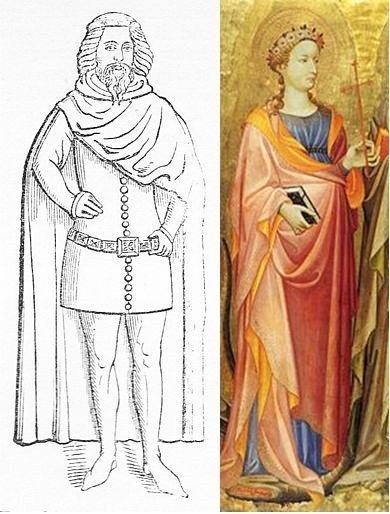
(The lovely couple. FYI, Lionel was almost seven feet, a very tall boi indeed by 14th century standards.)
Their wedding was part of a truly staggering bit of late Medieval diplomacy. As part of his broader effort to win the Hundred Years War, Edward III wanted to marry his son Edmund of Langley (the ancestor of the House of York) to Margaret of Flanders, who was an heiress and a half, inheriting the counties of Flanders, Burgundy, Nevers, Rethel, and Artois. This marriage would greatly strengthen England’s position in the Low Countries by directly incorporating the sometimes unreliable Burgundians into their continental empire. The problem was that Edmund and Margaret were related, and Urban V was dragging his heels on granting a dispensation.
Edward decided to jog the Pope’s elbow by arranging a marriage between his second son and the Duke of Milan, who was not only the conqueror of Pavia, but also the Imperial Vicar (the Holy Roman Emperor’s man in Italy) and thus the chief enemy of the Pope in the Guelph-Ghibeline Wars. And since Milan was the great power of northwestern Italy (especially after Duke Galeazzo married Bianca of Savoy), this also placed the Visconti in a position to threaten Valois France’s southern border. In return for the Visconti’s aid against France, Edward in turn promised to support Milan’s bid for hegemony in Italy:
For Lionel his sonne with theim to send The duke his doughter of Melayn for to wed Promysing then hym so to recommend That of Itale the rule sholde all be led By hym and his frendes of Italye bred.
So already we have a marriage that could have potentially changed the course of European history in several ways:
It could have dramatically reshaped the Hundred Years War, allowing England to invade Valois France from the south up through the Loire valley, and then push west to link up with Aquitaine. At the very least, the Valois would have had to hold back troops to guard their backs, which would have weakened their attacks on Brittany, Normandy, and Aquitaine.
If the marriage had resulted in a male heir, it could have entirely prevented the Wars of the Roses. See, when Richard II was deposed, Henry Bolingbroke claimed the throne of England as the son of John of Gaunt, the third son of Edward III, and thus gave rise to the House of Lancaster. The Yorkists descended from the male line through Edmund of Langely, the fourth son, which was something of a problem, so instead they claimed their right to rule from Lionel of Clarence through his daughter Philippa, who married Edmund Mortimer the Earl of March, and thus gave rise to the Mortimer claim. However, if there’s an male heir of the House of Clarence, Henry Bolingbroke might not become king and the Yorkists certainly couldn’t have claimed to come before the Lancastrians.
In turn, the marriage would have given England a claim on the Duchy of Milan, which could have dramatically changed the course of Renaissance Italian history. See, one of the major fulcrums of the Italian Wars between France and Spain was Louis XII’s claim to the Duchy of Milan through his grandmother Valentina Visconti (man, the Visconti loved alliteration!), which he argued outranked the Sforza’s claim through Bianca Maria, the natural daughter of the last Visconti Duke of Milan. But if England has a preceding claim to Milan through Violante, the wars might go in a very different direction.

But enough about European politics, let’s talk about OTT medieval weddings. Lionel traveled to Milan in style, with 457 knights and squires and 1280 squires, which required a fleet of 52 ships to transport him to Calais. Despite the whole hundred-year-war business, Charles V feted the bridegroom with gifts worth 20,000 florins (£1 million in today’s money). Along the way, Lionel hired Sir John Hawkwood, the legendary English condotierri, both to serve as his escort and implicitly as England’s contribution to Milan’s wars against the Papal States.
The wedding ceremony was carried out at the Church of Santa Maria Maggiori, the future Cathedral of Milan, and celebrated outdoors, so that the people of Milan could witness the magnificence. The banquet was thirty courses of meat and fish on gilt plate, with wedding gifts of war horses, hounds and hawks, and full suits of armor paraded in between the courses. But to me, the main attraction is the guest list. To show everyone that they weren’t just medieval warlords but men of culture, both the groom and bride’s party brought some of the brighest lights of European culture to the party. The English brought Geoffrey Chaucer and the chronicler and Arthurian poet Jean Froissart; not to be outdone, the Italians responded by getting Petrarch himself, arguably the father of Humanism, the modern Italian language, and the Renaissance itself, to show up for a free meal. I’m not usually one for wanting to have lived in the past, but I’d find it very hard to turn down a seat at that dinner table, just to watch Chaucer take the piss out of Froissart’s chivalric romance while Petrarch argues for an entirely new philosophy and aesthetic.

And just to add some spice, it all ends in tragedy. Lionel, an exceedingly healthy young man, dies five months later, with his deputy Edward le Despenser claiming that Galeazzo had poisoned his son-in-law, perhaps in order to get out of having to pay a stupendous dowry of 100,000 florins (£5.5 million in todays money). Le Despenser was so pissed off that he hired Sir John Hawkwood to hold the towns in the Piedmont that had been given to Lionel in the marriage, and to make war on the Visconti.
Whether Lionel was in fact poisoned - it’s worth noting that Violante’s second husband was in fact assassinated by the Visconti in order to get their hands on Monferrato, and her third husband (a Visconti cousin) was imprisoned and murdered by her brother in order to solidify his control over Milan - and indeed, whether he was murdered by the Visconti to get out of a debt or by agents of the Pope to thwart the Visconti and the Planagenets, we’ll never know.
However, it’d make a hell of an Altmanesque ensemble movie, with dynasties scheming and dreaming and coming to nothing, while cultural giants dispute platonic love versus sex and Christian virtue versus Humanism, and professional mercenaries are just there looking to get paid.
59 notes
·
View notes
Text
FE4 run - the unofficial 3rd Gen
Procrastination at its finest here - what would happen in this run of FE4 after several years?
warning, as always, this is not serious
Queen Larcei and King Seliph of Granvalle are actually pissed at the reconstruction and their own Kingdom - why should they start trading with Agustria first and help them more than help Isaach?
The “nobles” can’t tell them that they’re “barbarians” since Larcei is obviously Isaachian so they use the “it’s too far to send help there, we must secure the Yied Desert first if we want to cross and provide them with goods etc...” card.
But then Larcei tells them that Verdane is closer, and yet Granvalle isn’t helping her brother with his rebel-taming duties. Hell, if she could, she would go there to help him get rid of the bandits. But she can’t because she is Granvalle’s Queen.
Seliph understands that providing help to Verdane will bring less benefits to Granvalle than helping Agustria - who still has a functioning economy, and, besides, as the son of Sigurd, he feels indebted to the people of Agustria (he might have read a letter his cousin’s wife gave him).
So while he is a bit furious but powerless about helping in Isaach’s reconstruction, he continues with the general trend of his forefathers and doesn’t give a fig about Verdane.
Things are difficult in mainland Granvalle for Tine, because everyone and their cats hate Freege, and demand outrageous fees for Reparations about what the Freeges did during the War - when i say everyone and their cats it’s mainly the New Kingdom of Thracia and the Miletos guilds.
Tine and Nanna will never be friendly towards each other until their deaths.
She doesn’t care about Miletos though. Hopefully Seliph puts in place a new policy about “sharing the costs” so every Duchy has to participate. Ultimately, Seliph suspends the payment when he and his cousin have a heart-to-heart talk around the famous bottle of wine because Leif knows now that bleeding dry a country or a duchy isn’t the way to build a lasting peace between nations.
Tine also has problems in her personal life, because he husband is in Jungby and if they manage to get an Ulir Crusader, soon enough they will need a Tordo one but hey, there’s no one left with Tordo blood and there’s a duty not to let bloodlines extinguish (that’s the last thing Seliph heard from F!Lewyn).
Speaking of Jungby, as expected, Faval is the golden puppet Duke whereas Lester - who managed to convince his mom to come home - rules the house. They try to repair some of Faval’s early decisions like opening the castle to accomodate all orphans in the Duchy and giving a quarter of their treasury to the Conote orphanage he used to live in. Faval loves his wife, of course, but she has a duty to recreate a new Tordo line, just like he had to take his Holy Weapon and fight in the last Holy War. So he isn’t sad.
A bit pissed, but not sad.
Johalva was acclaimed as both as a hero and as a kinslayer by the randoms of Dozel. Lana was really pissed about this, but Johalva didn’t deny the various accusations but still add that he had to do those things to protect the civilians, the innocents etc and Julius was really mad, didn’t you see the big monster disappearing in the sky during the end of the war?
He finally managed to be acclaimed as a good Duke after head-butting with some of his fellow Dukes who called him a “disgrace” and managed to make Seliph reconsider his idea of taxing Dozel more than the other Duchies (Chalphy, Jungby and Edda) in the war reparations efforts.
He and Lana also made graves for Johan and Brian, but none were made for Danan.
Lana’s a bit worried about Neir blood disappearing, but given one or two generations cousins could marry and a Crusader could be born again.
Oifey trains Seliph’s son in the ways of chivalry like he did with Seliph when he was younger, he hopes that Seliph’s son will inherit the Chalphy duchy, because he doesn’t feel like he belongs here, in the halls and the throne that were supposed to be Lord Sigurd’s and Lord Byron’s.
Arthur’s dream never comes to fruition, and despite his best efforts, he cannot manage to make the world see Velthomer as anything else but a nest of vipers and other less than savoury people. Fee is the only reason why he didn’t pack his things and run away to Silesse after ten years of rule.
Cherry on top, despite being Azelle’s son, Arthur is also known for having been the one to have killed everyone in his maternal family, so the randoms think they get the short end of the stick - he even killed Lord Ishtore who participated in the child rescues with his sister!
Hopefully with a certain priest’s help, he still managed to rebuild the Duchy so they’re not in the Verdane tier of development anymore. After Arthur’s death, the randoms in Velthomer will say that he wasn’t so bad as a Duke.
Speaking of the savages, Ulster makes his base in Evans because it’s closer to Granvalle and to the royal forces he petitions to help against the barbarians.
When Julia finally joins her husband after being fed up with flower pot duties, she moves the new capital to Genoa. “Verdane” is too remote from everywhere, and in Genoa, they’re both close to Granvalle and to Miletos. Why Miletos? The closer they are to them, the harder it is for them to ignore Verdane, so they will have to listen and maybe obey when they petition for help or to stop putting stupid tariffs on their exports.
Why should they listen? Because Julia is Seliph’s sister and he cares a lot about her well-being.
Ultimately Ulster becomes King of Verdane, but Julia remains a Princess of Granvalle. Their son is the Prince of Persia Verdane and also a Prince of Granvalle. Hopefullu, the kid has major naga blood (even if ulster was overjoyed when the kid managed to “learn” Astra because those rumours about Julia and Seliph are still bothering him, just like they bother his sister) and even if he likes Verdane a lot, some people start to tell him that he has every right to sit in Belhalla and live with the civilised people.
He tells them to fig off.
In Agustria however, there are several rebellions brewing, even after Ares became King. Some former Princes/Kings call him an imposter, other call him too subservient towards Granvalle.
Strangely, though, Lene managed to usher a new era of show and other performing arts - to the point that the New Kingdom became reknown for its great arts. The children puppet shows about the Great King Ares vanquishing the Demon of Granvalle are always full. Through those shows, Agustrians manage to live in a collective fantasy of how they participated in ending the war and fought against Loptyr.
Shagall was the Shield that tried to protect Agustria from the Loptyrians during the first Gen and Eldingan was the Sword who defeated them, but through a deception the Loptyrians had Eldingan killed, so he passed the role of the Sword to his son Ares - everyone was happy, even the old Shagall partisans who, at first, didn’t want Ares or Eldie’s line to usurp the previous line of the Kings of Agustria and reminded Ares of Eldie and House Nodion’s vows.
Sadly enough, Lene wanted to make the lives of the performers and other orphans better with the economic profits earnt by those shoes, but it disappeared in the pockets of the people who were organising said shows.
Delmud was busy ruling the rest of the country, and exchanging letters with his sister and King Seliph, as the cordial man he has always been.
In Thracia’s New Kingdom we had Leif and Nanna happily creating a new dynasty - and Altenna’s forever alone.
Arion disappeared, and everyone thought that the line of Dain perished with him. However, one of Leif’s former cleric friends told him that there is a child living in (again) an orphanage in Tahra who is Lord Arion’s kid, but for his own sake, it’s better to live as an ignorant peasant than as a prince who lost his kingdom, wouldn’t he agree?
Due to Altenna’s dedication, and Hannibal’s popularity, the Thracians weren’t that crushed when the unification happened, and even if the northeners still have a better lifestyle then their southerners brothers, at the end of Leif’s reign, both people start to have to same lifestyles as in, there are brigands and piss poor people on both sides of the peninsula, but also, rich merchants and assholes in the South too.
Leif is aware that when he asked money to Seliph he acted a bit selfishly, but his Kingdom passes first. They still managed to remain great friends, and Leif’s son married Seliph’s daughter.
In Silesse, Ced manages to get a major blooded baby on someone but realises that he was never cut out to be a King, given how the country governed itself without him during all those years.
However, he didn’t bail out like his Father, and started to make several researches about dragons, and the mytical land of Archanea - prompted by Loptyr’s sight at the end of the war, and also, because of F!Lewyn.
He volunteered on the first expedition (passing through the northern seas of Silesse) but realised that his place was in Silesse, to study more and, maybe, start to develop trading routes to the new land. It’s only during the last years of his life that he managed to see a returning ship - after several years, sailors finally managed to land somewhere ; they brought him special endemic fruits found in that new land : Zofian Oranges.
The Isaachian people were happy when Shanan returned, because they heard disturbing rumours about their King misbehaving in Thracia and thought that if those rumours started, that meant that he was dead and some man tried to usurp his good name.
They were relieved when they saw him again.
Since the Isaachians had been freed early, they manage to reinstall some sort of government in Isaach (the capital) and everyone from the other kingdoms pledged their allegiance to Shanan - granted, they couldn’t find the former nobles of Sophara, so it was just some elders who participated in the ceremony.
Shanan was a bit disappointed that Granvalle didn’t send as much help as they expected, but thought that maybe Seliph was busy managing internal affairs.
Sadly for him, Patty gave birth to 3 children who all had the brand of Odo on their backs.
He decided that the eldest would remain in Isaac, one would go to Sophara and the last to Ganeishire.
But the one who was in Sophara wanted to inherit Isaach’s throne, given how he was a boy while the eldest was a woman, and trouble ensued.
More trouble ensued when Seliph’s son didn’t want to return to Chalphy and remain in Belhalla, and when Julia’s granddaughter has had enough of Verdane and managed to steal the Book of Naga, wanting to return to Belhalla.
France Agustria declared itself the Holy land and elected a pope, who took residence in Orgahill and who managed to hear the voices whispers of the gods. Soon enough, being the eldest brother of the Pope, Ares’ son, when he became King, declared the Thracians heretics, for they were developing and practicing dark magic.
Miletos tried to rob everyone using the various tensions as catalysts, but, in the end, they were unable to do a thing when Ares’ second daughter managed to survive a shipwreck when Leif’s only son didn’t. Thracia accused Miletos of having staged an accident to get rid of their heir - Leif’s daughter managed to find (or forge, depends on the POV) a letter detailing how Agustria paid the corrupt Miletosians to sabotage her brother’s lifeboat.
Hopefully Seliph died a few years before the start of the Third War, so he never knew how much the next generation managed to screw what he and friends fought for.
the end
#FE4#FE4 run#FE5#i had to make some nods i couldn't help myself#long story big story there is no loptyr anymore but Jugdral is still a shit place#i know i might have over used the orphanage card but#after a war like that there a lot of orphanages around? idk#i tried to avoid mentionning daughters because we're still in jugdral#The thracian-agustrian war starts before Julia's granddaughter's nonsense#but look#shit without Loptyr's intervention!#isnt it wonderful#miletos as a catalyst#yes#finally they have some importance!#jugdral nonsense#look zofian oranges!
12 notes
·
View notes
Text
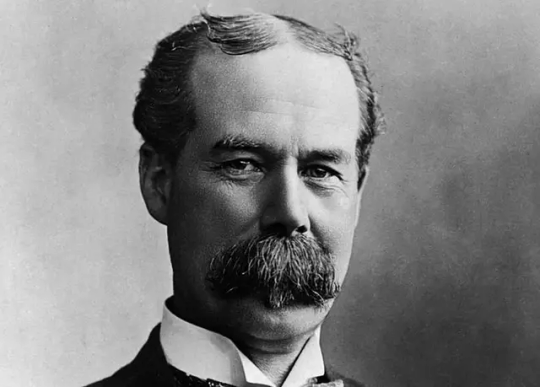
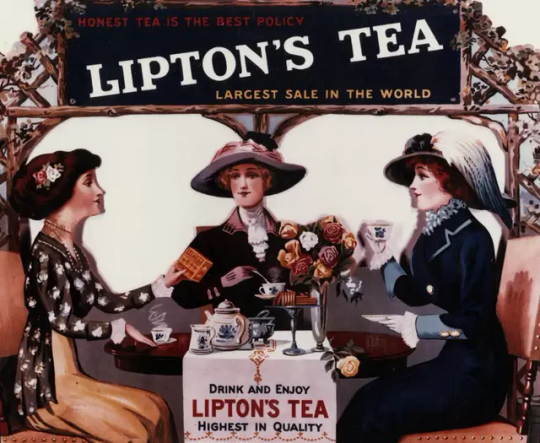

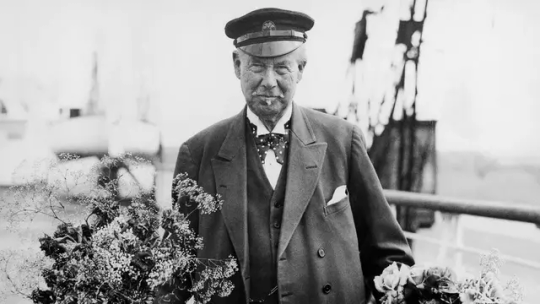

On October 2nd 1931 Sir Thomas Lipton, grocer, tea merchant died.
Say the name Lipton, and most people nowadays think of tea, although some of usthat are a certain age will recall the supermarkets. But behind that brand lies the extraordinary story of a rags-to-riches tycoon, self-publicist, philanthropist and sportsman who was honoured as "the world's best loser".
While his father worked in a succession of poorly paid jobs, young Tommy Lipton’s siblings all died in infancy, leaving him as the family’s only son.
Tommy had to leave school aged 13, because his parents needed an extra income to make ends meet. He also attended night school at the Gorbals Youth School. In 1864, he signed up as a cabin boy on a steamer running between Glasgow and Belfast and seems to have been taken with crew-members’ stories about the United States, so in 1865, Thomas used his savings to pay for a passage to New York spending the next five years there travelling across the country.
During this time he held many different jobs, including work at a tobacco plantation in Virginia; as an accountant at a rice plantation in South Carolina; as a door-to-door salesman in New Orleans; as a farmhand in New Jersey; and as a grocery assistant in New York.
Thomas returned to Glasgow in 1870. After spending some time helping his parents at their shop, he established one of his own, Lipton’s Market, at 101 Stobcross Street in the Anderston area of the city. This proved highly successful and Lipton went on to establish a chain of shops, first in Glasgow and then across Scotland, before expanding to cover the whole of the UK over the next ten years.
Meanwhile, the demand for tea was increasing among the middle classes and in 1888, by which time Lipton had 300 stores, he set out to bypass the traditional lines of supply for tea by investing directly in tea plantations. The Lipton Tea brand he established offered good quality for low prices and proved hugely popular, expanding the market for tea to all parts of society and establishing it as the national drink of choice.
Lipton was a big fan of promotional stunts. When his first 20,000 tea chests arrived in Glasgow he put on a party, complete with a brass band and bagpipe parade. In 1893 Sir Thomas Lipton officially established the Thomas J Lipton Company, a tea packaging company based in Hoboken, New Jersey . He felt that tea should be a drink for everyone, not just the wealthy , so he strived to make packaging and shipping less expensive.
Instead of arriving in crates, Sir Thomas packaged his loose tea in multiple weight options. The tea was also standardised, so Lipton customers knew exactly what to expect.
Thomas Lipton developed a passion for yachting, between 1899 and 1930 Lipton challenged the American holders of the America’s Cup through the Royal Ulster Yacht Club five times with yachts he named Shamrock through Shamrock V. He never won the cup, but he was awarded a special trophy as “the best of all losers”. This may sound double-edged, but one effect of his efforts to win the cup was to make his name well known across the United States, and his tea very popular there.
Although Lipton, through his yachting, became a friend of royalty, as a self-made man he still had difficulty breaking into some corners of the highly stratified British society of the day. He was, for example, only accepted as a member of the Royal Yacht Squadron shortly before his death.
Lipton died at his home in north London in 1931. He left most of his wealth to his native city of Glasgow. His yachting trophies are now on display at the Kelvingrove Art Gallery and Museum. Sir Thomas Lipton was buried alongside his parents and siblings in Glasgow’s Southern Necropolis.
Liptons continues today as part of the multinational Unilever brands, their teas and other beverages still bear his name and are a world known brand, not bad for a young lad born in a Glasgow Tenement to Irish immigrants.
33 notes
·
View notes
Photo

Sojourner Truth (born Isabella [Belle] Baumfree; November 18, 1797 – November 26, 1883) was an African-American abolitionist and women's rights activist. She was born into slavery in Swartekill, Ulster County, NY, but escaped with her infant daughter to freedom in 1826. After going to court to recover her son in 1828, she became the first African American woman to win such a case against a white man. She gave herself the name Sojourner Truth in 1843 after she became convinced that God had called her to leave the city and go into the countryside "testifying the hope that was in her". Her best-known speech was delivered extemporaneously, in 1851, at the Ohio Women's Rights Convention in Akron. The speech became widely known during the Civil War by the title "Ain't I a Woman?," a variation of the original speech re-written by someone else using a stereotypical Southern dialect, whereas She was from New York and grew up speaking Dutch as her first language. During the Civil War, she helped recruit African American troops for the Union Army; after the war, she tried unsuccessfully to secure land grants from the federal government for former slaves. In 2014, She was included in Smithsonian magazine's list of the "100 Most Significant Americans of All Time". #africanhistory365 #africanexcellence https://www.instagram.com/p/ClGbmFFL-pZ/?igshid=NGJjMDIxMWI=
0 notes
Photo

Sojourner Truth; (born Isabella [Belle] Baumfree; 1797 – November 26, 1883) was an African -American abolitionist and women's rights activist. Truth was born into slavery in Swartekill, Ulster County, New York, but escaped with her infant daughter to freedom in 1826. After going to court to recover her son in 1828, she became the first black woman to win such a case against a white man. She gave herself the name Sojourner Truth in 1843 after she became convinced that God had called her to leave the city and go into the countryside "testifying the hope that was in her". Her best-known speech was delivered extemporaneously, in 1851, at the Ohio Women's Rights Convention in Akron, Ohio. The speech became widely known during the Civil War by the title "Ain't I a Woman?," a variation of the original speech re-written by someone else using a stereotypical Southern dialect; whereas Sojourner Truth was from New York and grew up speaking Dutch as her first language. During the Civil War, Truth helped recruit black troops for the Union Army; after the war, she tried unsuccessfully to secure land grants from the federal government for former slaves (summarised as the promise of Forty acres and a mule). In 2014, Truth was included in Smithsonianmagazine's list of the "100 Most Significant Americans of All Time". Occupation: Abolitionist, author, human rights activist #truth #blackhistorymonth #history #americanhistory #american #slave #USA #unitedstates #destiny #first #hero #free #blessed #courage #author #fighter (at Street Jitsu) https://www.instagram.com/p/BtmNcjsgxLJ/?utm_source=ig_tumblr_share&igshid=e81wdee7y1tr
#truth#blackhistorymonth#history#americanhistory#american#slave#usa#unitedstates#destiny#first#hero#free#blessed#courage#author#fighter
1 note
·
View note
Text
Sons of Southern Ulster: Live In The Past (Pete Briquette Remix)
Sons of Southern Ulster: Live In The Past (Pete Briquette Remix)
Sons of Southern Ulster han logrado una estupenda mancuerna con Pete Briquette de The Boomtown Rats, quien selecciona 4 canciones que la banda editara con su Sinners and Lost Souls de 2020, y más allá de remezclarlas, las reinventa para dar forma al Turf Accountant Schemes EP, material que llega a todas las plataformas como Apple Music y Spotify, el próximo 27 de Agosto, permaneciendo hasta ésa…

View On WordPress
0 notes
Text
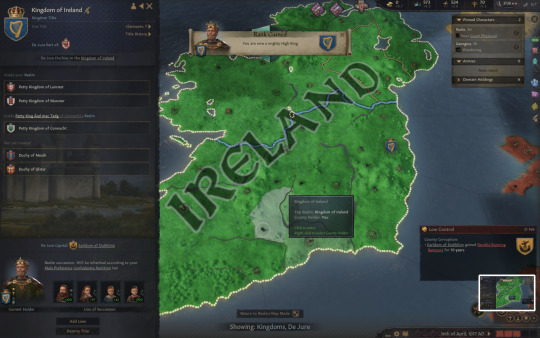
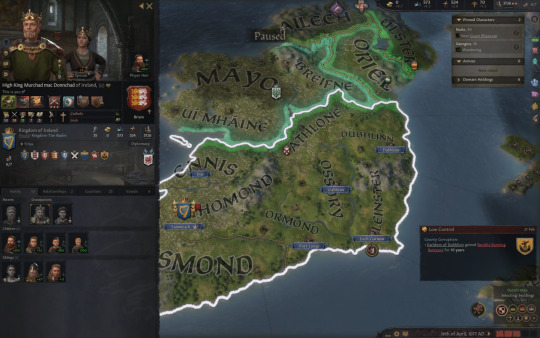
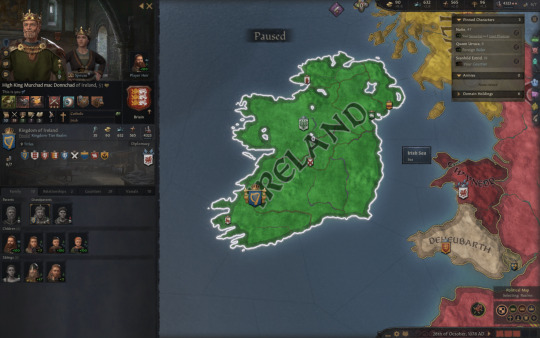
At first, when I formed the Kingdom of Ireland as Murchad, we only had territories up to the southern part of Ireland (Dubhlinn ceded to us through a fabricated claim war - yes, my Archbishop has been busy).
But soon after, the northern part of Ireland began to accept vassalisation to Ireland, and slowly the Duke of Connacht and the Earls of Oriel, Ailech and Ulster fell down to their rightful liege - High King Murchad mac Donnchad of Ireland! He is temperate, wrathful, impatient, a skilled tactician, overseer, a cautious leader and a logistician - every bit the perfect makings of a King of the most High.
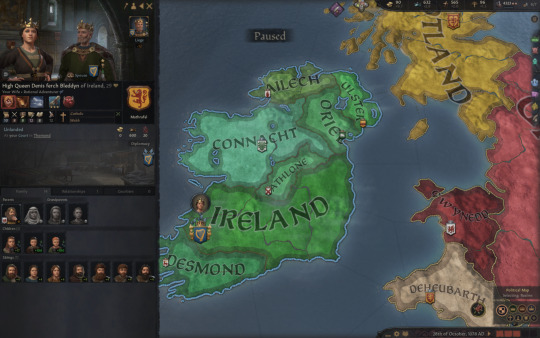
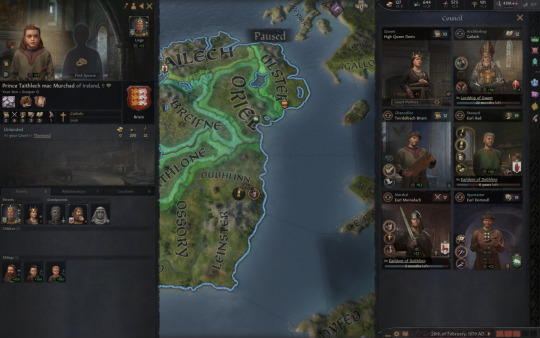
The same cannot be said however, of my adulteress of a wife, High Queen Denis ferch Bleddyn of Ireland who dislikes Murchad but still produces 3 sons for him. Her eldest son, however, is said to be the product of her scandalous affair with Ragnvald, and still is reflected in the game to be the son of Murchad (I don't know why the uncovering of the secret Disputed Heritage did not assign the trait Bastard and re-route his father to Ragnvald instead of Murchad.)
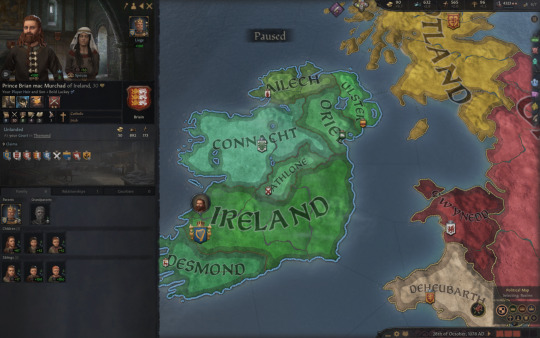
Lastly, Prince Brian mac Murchad of Ireland has pretty average stats across the board and is married to a House Jimena lady. His mother is of unknown origin, rumoured to be one of the commoner scullery maids in the castle (and too unimportant for the game to reflect in-game).
0 notes